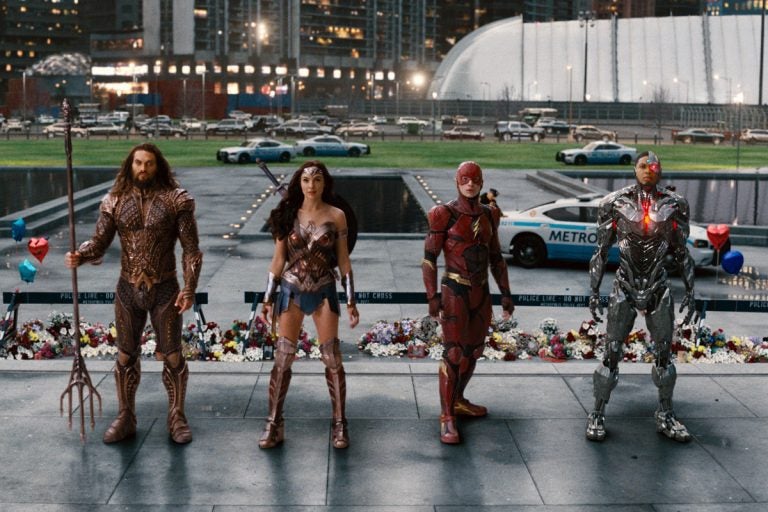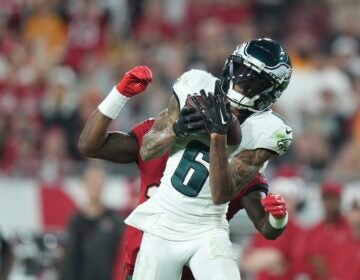5 lessons from the comic book superhero movies of 2017
While distinct in many ways, considering these films as a group points toward some lessons about the future of the genre.

This image released by Warner Bros. Pictures shows (from left) Jason Momoa, Gal Gadot, Ezra Miller, and Ray Fisher in a scene from "Justice League." (Warner Bros. Entertainment Inc. via AP)
We live in the age of the comic book superhero blockbuster. Just this year, six such tentpoles hit the big screens: “Logan,” “Guardians of the Galaxy Vol. 2,” “Wonder Woman,” “Spider-Man: Homecoming,” “Thor: Ragnarok,” and “Justice League.”
While distinct in many ways, considering these films as a group points toward some lessons about the future of the genre.
1. We were waiting for a woman-led film.
Marvel CEO Ike Perlmutter infamously dismissed the financial prospects of female superheroes, pointing to the commercial and critical failures of 2004’s “Catwoman” and 2005’s “Elektra.” That attitude was so entrenched that every male superhero pic possible (think “Ant-Man”) was greenlit before “Wonder Woman” finally hit theaters this past June.
Since there were few precedents, prognosticators weren’t sure what to expect. The DC Extended Universe brand was a potential burden, and box-office tracking had the movie set to open with a soft $65 million over the opening weekend.
Reviews were stellar, however, and the film opened to $103 million. Positive word of mouth encouraged general audiences as the pic experienced some of the best box-office longevity in recent memory.
“Wonder Woman” joined the long list of lightning-in-a-bottle superhero origin stories, like “Superman,” “Batman” and “Spider-Man,” that captured the cultural zeitgeist.
By the end, the movie finished with an $821 million worldwide gross.
Star Gal Gadot and director Patty Jenkins are returning for a sequel in 2019. That same year will see the release of “Captain Marvel,” the Marvel Cinematic Universe’s first female-led solo outing, as well as Sony’s Silver Sable and Black Cat team-up film.
2. Change beats more of the same.
The strategy of just giving people what they liked before took a hit this year.
Realistically, the MCU’s attempt to reboot Spider-Man for a third time should’ve floundered. Yet audiences and critics loved “Spider-Man: Homecoming.” This is likely because the filmmakers resisted doing another redundant origin tale. No spider bite; no Uncle Ben getting shot. Instead, we’re dropped right into the middle of Spidey’s adventures.
When it comes to baggage, though, no character has more than Hugh Jackman’s Wolverine. After eight appearances, the Wolverine and the X-Men universe as a whole was starting to get stale.
To counteract that lethargy, Jackman leveraged his influence to create “Logan,” his final appearance as the famed anti-hero. “Logan” has more in common with a western than with a comic-book blockbuster, and it became his most-beloved take on the character.
Even Chris Hemsworth’s Thor got a literal and figurative make-over in “Thor: Ragnarok.” Indie director Taika Waititi essentially transitioned the God of Thunder away from Kenneth Branagh’s Shakespearean sensibility and more towards Hemsworth’s natural comedic talents. The result was box office gold.
Conversely, this desire for a new direction likely hurt James Gunn’s “Guardians of the Galaxy Vol. 2”. Despite its quality and success, viewers seemed disappointed that the second installment followed the same tone as the first.
3. Humor is still king.
Make no mistake, though, Guardians’ comedic style isn’t going away. In fact, it may just be getting started.
After all, Vol. 2 still outgrossed its game-changing predecessor ($863M to $773M). Plus “Thor: Ragnarok” is more spiritually akin to the Guardians films than the prior Thor titles. The newest Spider-Man was even intentionally given a John Hughes vibe.
This shift was most apparent with “Wonder Woman,” as DC and Warner Bros. deliberately moved away from the dour “Batman V Superman.”
Jenkins used Richard Donner’s original Superman as a model for making Diana Prince a fish out of water in World War I London with Chris Pine’s Steve Trevor and others serving as comic relief.
Then, of course, there were the reshoots for Justice League that were overseen by Joss Whedon. Whedon, the director of the first two Avengers films, was brought in to infuse his brand of quippy and snarky dialogue.
4. The R-rated superhero pic is for real.
Superheroes aren’t just for kids anymore.
The incredible profits yielded by 2016’s “Deadpool” proved an R rating is not a death sentence. The success of “Logan” suggests the Merc with a Mouth isn’t an outlier either.
“Deadpool 2” is coming next year, and Fox also has a horror-inspired offering titled “The New Mutants” on its 2018 slate.
Once believed to be a scarlet letter, that R rating gives Fox the freedom to use as much violence, crude language, and sex in their comic-book movies as the directors see fit. After years of trying, the studio may have at last stumbled into its own identity.
5. Team-ups may be in trouble
When “The Avengers” demolished box-office records with a $207 million opening five years ago, Warner Bros. must’ve been salivating.
Their own team, the Justice League, contained far more recognizable and popular characters, including Batman and Superman. A team-up adventure with heroes like Wonder Woman, Aquaman and Flash could equal if not top what The Avengers did.
Five years later, “Justice League” finished with just $93 million in box office receipts over its first three days. A whole other article could be written about why this happened, but there’s one possibility that should strike fear into the heart of Hollywood. What if audiences are tiring of this trope?
For instance, “Avengers: Age of Ultron” did fantastic business but still fell short of the original. Fans were more interested in Wolverine’s send-off than the latest ensemble X-Men film. Wonder Woman’s origin story became the event movie of the summer, yet fans aren’t in a rush to see her as part of a team.
This would be terrible news for the MCU. They’ve spent 10 years building up to their climactic two-part “Infinity War” arc, which will unite practically every hero in their universe. The reception to Infinity War may very well determine the fate of superhero team-ups.
WHYY is your source for fact-based, in-depth journalism and information. As a nonprofit organization, we rely on financial support from readers like you. Please give today.





